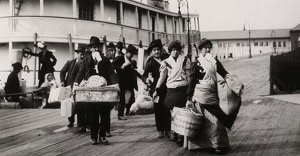(23)
You don’t know me.
I came from a small village where grainy bread, kneaded by the leathery hands of my grandfather, was made fresh every day, sold to farmers and school children who packed it into their satchels on their way to face the world. My grandmother stayed at home most of the time, her mind still sharp as she sat in a wooden chair knitting, humming and praying that the end would come soon.
My father drove a truck, making just enough to feed his small family, my Mom, brother, and me. But he knew we had to leave — there seemed to be little choice. With each new day, there was more reason to escape, to walk and ride and walk again to the edge, an exit point from this despair and an entry to another world.
You don’t really know me, but I matter, because I am the son of a mother who weeps at night in fear that she will lose me, that my future is in her weak hands that barely have the strength to hold my frail body. Like your son and daughter, your cousin or neighbor, I want to be strong and brave, but I am scared because of what I see and hear.
My uncle says we will go soon, we will leave at night when I am asleep, and he will carry me in his arms. My aunt will take food and water so I should not worry. Be brave, he says, we will all be OK. Our journey may be hard at first, but there will be many friends along the way who will go with us, so we won’t be alone. We have hope.
No, you don’t really know me, but I am your past. I am the Irish son of your great grandfather who nearly starved to death eating only potatoes. We came to live in Boston. I’m the Columbian nephew of your housepainter who was almost taken by the drug lords. He rents an apartment in Atlanta. Do you remember the nice Korean bank manager in Seattle who helped you with your car loan? I am her aunt who worked eighty hours a week at the corner market to put her through business school. I am the old friend of the kosher butcher whose parents escaped the Nazis in Poland and came to the Lower East Side to work in the sweatshops, who saved enough money to open that deli where you bought Matzoh for Passover this year.
How about that cop who wrote you that speeding ticket a few years ago on I-80? Guess what — he was the godson of the parish priest who arrived after war broke out in Bosnia, who heard that you had a statue with an inscription that said “Give me your tired, your poor, your huddled masses.” 
That’s why he came and worked so hard to make sure his divine progeny could realize his dream of helping others. I am the great uncle of your college professor who left Kenya when he was still in the belly of my mother while she slaved on your plantation.
No, you think you don’t know me, but I am your past and your future, your brother and sister. I am the rest of those words from that statue, the one in your New York harbor that talks about the wretched refuse coming to your teeming shore. I am a homeless, tempest-tossed foreigner — a child caught in a world gone mad.
And I am no different than you, my skin wrapped around my beating heart — pleading for mercy and loving-kindness and waiting for this long night to end.